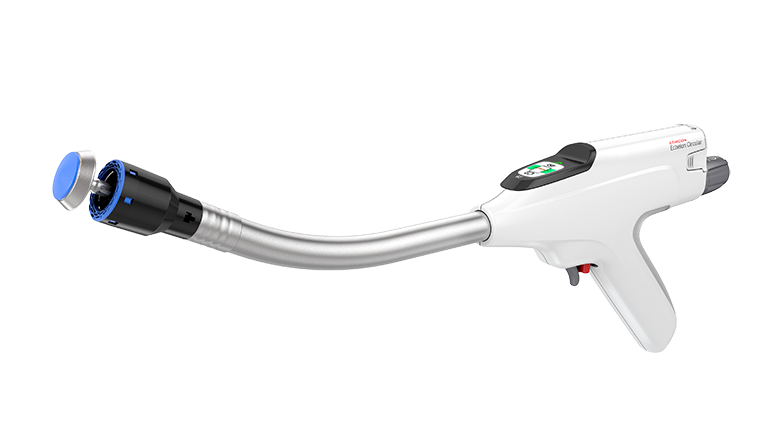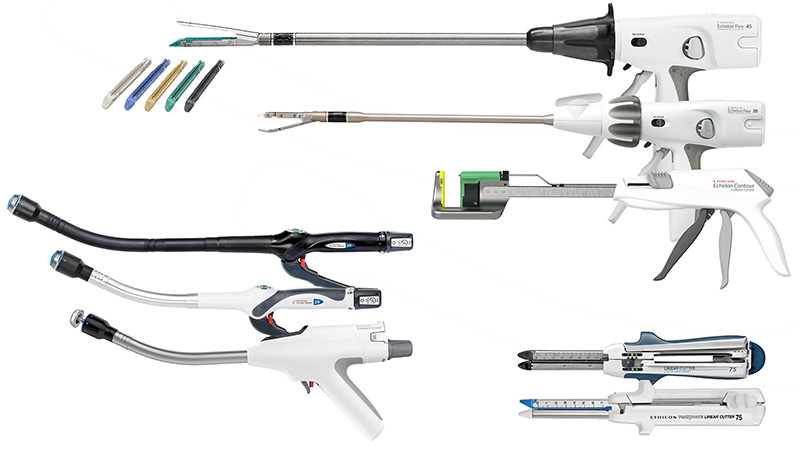Surgical Stapler Complications and Recall
If you or a loved one had undergone surgery that called for the use of surgical staplers, and has experienced internal bleeding, organ damage, fistula formation, and many other surgical stapler injuries, you may be eligible for compensation by filing a Surgical Stapler lawsuit.
Surgical Stapler Injuries
Surgical staplers can cause serious injuries by firing malformed staples, or mis-firing staples into surrounding organs or other tissue in the body during surgical procedures. Defective staplers may not fire all staples needed to bind an incision, causing bleeding, leaving an incision unsealed, and leaving opportunities for infection. These defects have led to numerous recalls based on serious injuries and deaths.

National Library of Medicine Researchers have discovered that patients have a higher risk of surgical site infection when using surgical staples over standard sutures.
How Surgical Staplers Work
Surgical staplers work by compressing tissue, connecting two pieces of tissue with staggered rows of B-shaped surgical staples, and cutting away excess tissue to create a clean closure of the surgical wound.
When using linear staplers, the surgeon uses the handles at one end to close the “jaws” of the stapler at the other end over the tissue. When the surgeon fires the stapler, a row of staples binds the tissue together and a blade cuts the tissue between the staples. The process intends to close the wound and prevent bleeding.

- Linear Staplers: Used to connect tissue during minimally invasive surgeries or to remove an organ.
- Circular Staplers: Used for surgeries involving the digestive tract from the throat to the colon. Circular staplers fire two staggered rows of staples from a circular cartridge. This circular layout allows the stapler to connect two sections of the intestine, or another tube-like structure; after a portion has been removed. The staples cause tissue to pinch up as rings or donuts between the staples. A built-in blade slices off any overlaying tissue, sealing the connection.
A 2022 study reviewed the surgical site infection rate of wound closure using staples versus sutures in elective knee and hip arthroplasties have increased. Bleeding or the reopening of an incision can happen if the staple line is not complete or does not hold.
Surgical Stapler Complications
Surgical stapler and staple malfunctions during surgery can cause complications including bleeding, sepsis, organ and tissue damage, increased risk of cancer recurrence, even death.
Surgical stapler and staple complications are often the result of malfunctioning devices. The devices are often used in place of sutures because they are generally faster and less painful for patients. The staplers are designed to implant several staples at once, quickly closing an incision or reconnecting tube-like structures, such as arteries or intestines. If they malfunction, they can damage nearby tissue or fail to fully close open incisions.
Most Common Surgical Stapler Malfunctions
Common malfunctions include misshapen staples, stapler misfiring and use of improper staple size, all of which can prolong surgery and expose patients to serious complications.
The FDA received more than 11,500 reports of serious surgical stapler complications from 2011 through 2018. Complications can occur during surgery and may be immediately addressed by the surgical team.
- Difficulty in firing
- Failure of the stapler to fire the staple
- Malformation of staples
- Misfiring
- Opening of the staple line
- User applying staples to the wrong tissue
- User applying the wrong size staples to tissue
Signs and Symptoms of Surgical Stapler Complications
Surgical stapler complications can be serious, and you should seek immediate medical attention if you experience any of the following signs or symptoms:
- Reopening of the incision
- New or severe pain
- Bleeding at the incision
- Redness or swelling around or near the incision
- Red streaks moving outward from the incision
- Dryness or darkened skin around the staples
- Fever of 100 degrees or higher, lasting four hours or longer
- Yellow, brown or green discharge around the incision or staples
Surgical stapler and staple malfunctions have resulted in thousands of serious complications. Malfunctions can prolong surgical procedures, keeping a patient under anesthesia longer than planned, which can present additional complications.
Staple injuries may cause serious bodily damage that often requires other surgical interventions.
Surgical Stapler Manufacturer Recalls

Johnson & Johnson subsidiary Ethicon recalled 92,496 surgical staplers in April 2019 from concerns that they might not fire with enough force to completely form staples, increasing the chances of organ damage.
The recall affected two models of the company’s Endo-Surgery Intraluminal Staplers used in gastrointestinal tract surgeries.

Ethicon recalled more than 92,000 Endo-Surgery Intraluminal Staplers on April 11, 2019. Ethicon reported that two patients had been injured by the devices, according to the FDA. In both cases, the devices misfired, cutting portions of the rectum. Misfires or other malfunctions can prolong operations or require doctors to perform unplanned surgery to correct the damage.
The FDA warned that the misfires could increase complications from surgical staplers, including the risk for bleeding, infection, and permanent damage to organs.
In 2015, Ethicon recalled 6,744 Endopath Echelon Flex Powered Vascular Staplers with Advanced Placement Tip and White Reloads. The devices were used in gynecologic, urologic, thoracic, pediatric and general minimally invasive surgeries.
The company reported that an inspection had found the surgical staplers’ cartridges may not insert a complete line of staples when fired.

Medtronic issued two recalls of its Endo GIA staplers and staple cartridges from select production lots, or batches, in 2018 and 2019. Both recalls involved possible missing components. The company said the defects could affect staple alignment and lead to serious complications.
At least five people were injured by staplers included in the 2018 recall, according to the company. The 2019 recall involved defects in staple cartridges that were spotted during the manufacturing process. The company reported “no confirmed complaints” about the devices from doctors or patients.
FDA Recall Classifications:
The U.S. Food and Drug Administration branded the recall as a Class I recall. The FDA warned in that the devices could cause serious injuries or death. Some people who have been injured by malfunctioning devices have suffered serious injuries and have filed surgical stapler lawsuits.
Recalls are actions taken by a firm to remove a product from the market. Recalls may be made by a manufacturer’s own initiative, by FDA request, or by FDA order under court order.
- Class I recall: a situation in which there is a reasonable probability that the use of or exposure to a violative product will cause serious adverse health consequences or death.
- Class II recall: a situation in which use of or exposure to a violative product may cause temporary or medically reversible adverse health consequences or where the probability of serious adverse health consequences is remote.
- Class III recall: a situation in which use of or exposure to a violative product is not likely to cause adverse health consequences.
- Market withdrawal: occurs when a product has a minor violation that would not be subject to FDA legal action. The firm removes the product from the market or corrects the violation. For example, a product removed from the market due to tampering, without evidence of manufacturing or distribution problems, would be a market withdrawal.
- Medical device safety alert: issued in situations where a medical device may present an unreasonable risk of substantial harm. In some case, these situations also are considered recalls.
Surgical Stapler Manufacturers
Manufacturers recalled more than 3.4 million surgical staplers, staples, cartridges and components between 2013 and 2019. Some of the recalls followed reports of defects that resulted in patient injuries. Others were issued after companies caught defects during manufacturing.
$79.8 Million Settlement for Stapler-Related Sepsis
The largest surgical stapler verdict was nearly $80 million awarded by a California jury to a former police officer for life-threatening injuries from a defective stapler.
Three days after Florence K. underwent surgery in 2012, doctors found her bowel was stapled to her rectal wall. The blockage caused her bowel to rupture causing sepsis, a life-threatening response to infection.
*The jury awarded her $70 million in punitive damages and $9.8 million in compensatory damages.
A 2019 recall of certain Medtronic Tri-Staple reloads and cartridges warned that the devices could cause complications such as bleeding, leaks between organs that had been reconnected with the staples, peritonitis, and a collapsed lung that could lead to infection and sepsis.
In a 2018 recall of Covidien Endo GIA Articulating Reloads, Medtronic reported at least five injuries. If misassembled, the device might fire an incomplete staple line. This could lead to bleeding or leakage of contents from the intestine to the body cavity.
Medtronic, which acquired Covidien in 2014, and Johnson & Johnson subsidiary Ethicon control the vast majority of the surgical stapler market in the United States. The two companies produce 4 out of 5 surgical staplers used in American hospitals.
Johnson and Johnson’s division and Medtronic are the two largest surgical stapler manufacturers. Together, they produced about 80% of the stapler market in 2015. The devices accounted for close to $2 billion in revenue for manufacturers in 2016, with most sold in North America.
* Medtronic and Ethicon products account for the largest surgical stapler-related recalls. Both companies, combined, have recalled more than 3.4 million staplers, staples, and components since 2013.
Surgical Stapler Manufacturers Include:
- Covidien (Medtronic)*
- Ethicon US (Johnson & Johnson)*
- 3M
- B. Braun Melsungen AG
- Cardica
- Care Fusion Corporation
- CONMED
- Frankenman International
- Meril Life Science
- Purple Surgical
- Smith & Nephew
- Stryker
- U.S. Surgical
- Welfare Medical
- Reach Surgical
- Zimmer Biomet
Medtronic reported at least five people injured prior to a May 2018 recall. The companies often found manufacturing defects that could cause injuries.
In a 2019 recall of more than 3 Million TriStaple reloads, Medtronic reported that a missing component had the potential for staples to fail, leading to “bleeding, anastomotic leak, peritonitis, or pneumothorax which can result in the potential for infection and/or sepsis.”
Other defects leading to recalls had the potential to cause bleeding or the leaking of intestinal contents into surrounding body parts.
Surgical Stapler Complications & Malfunctions, 2011–2018
- Deaths – 366
- Serious Injuries – over 9,000
- Malfunctions – over 32,000
Potential Compensation for Surgical Stapler Injuries
Surgical stapler injuries can be serious or even deadly. They can cause people to be incapacitated for long periods of time or cost families their loved ones. People can seek compensation for both past and future injuries from these devices.
Past and Future Compensation in Surgical Stapler Lawsuits:
- Medical expenses
- Funeral expenses for deaths resulting from stapler injuries
- Pain and suffering, both physical and mental
- Lost wages
- Loss of earning capacity
- Loss of enjoyment of life
- Punitive damages to punish the manufacturer
$5.5 Million Settlement for Stapler-Related Death
In 2017, Ryan S. of Illinois agreed to a $5.5 million settlement over the death of his wife due to a surgical stapler injury in 2013.
April S. bled to death following surgery to remove a noncancerous mass on her liver. The stapler cut a blood vessel but failed to properly seal it, causing “massive blood loss, cardiac arrest related to the blood loss, and death the same day.”
*The lawsuit named Memorial Medical Center in Springfield, Ill., the Southern Illinois University School of Medicine’s group practice doctors, and Covidien. All parties agreed to pay a share of the settlement. Covidien agreed to pay $250,000 as its part of the wrongful death lawsuit. Medtronic acquired Covidien in 2014.
Do you have a Surgical Stapler Lawsuit?
If you or your loved one suffered from side effects, injuries, needed additional surgeries from defective surgical staplers used in hospitals, and even affected your personal life with loss of enjoyment of life and lost wages, then you can contact us for a free case evaluation.
Our medical device lawyers can help you file a Surgical Stapler Lawsuit today. Please call our offices at 214.987.0005 to schedule a free consultation with an experienced Medical Device attorney who can answer your questions and evaluate your case.
Miller Weisbrod Olesky serves clients in Texas and nationwide. If you are calling from outside the DFW Metroplex, please call us toll free at 888.987.0005. Feel free to fill out the form on this page to submit your potential case for a free case evaluation.

